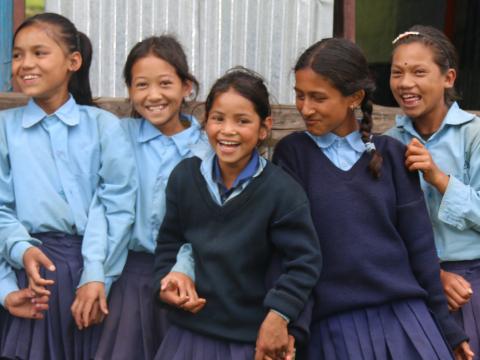Where children enjoy learning

Teachers at Garjangdhunga Higher Secondary School and Seti Devi Primary School at Shyama, Dolakha are aware about the importance of education in a person's life but one thing they recently found out is how education can be delivered to students through a child-friendly perspective prioritising child centered learning.
Child centered learning is putting the needs of the children first as in contrast to the traditional education wherein teachers direct the learning process and students assume a receptive role. Child centered learning is focused on each child’s needs, abilities, interests and learning styles, placing the teacher as a facilitator of learning.
Education is the most powerful weapon we can use to change the world. - Nelson Mandela
World Vision has been conducting training for teachers on Child-Friendly Teaching Learning (CFTL) in earthquake-affected districts with the support of Disasters Emergency Committee, United Kingdom. The training demonstrates how schools can adapt to the needs of children, rather than children adapting to the needs of the school.
Jamuna Basnet and four other teachers from Seti Devi Primary School, which has highly affected by the earthquake, took part in the 3-day training. She says, "I learnt how we can use music, sports and play to teach students in a child-friendly way. This way the students learn faster and moreover, they enjoy the learning process and become more active and participative." She adds, "I have noticed how my students have become more active after I implemented 'learning through play' approach."
Thakur Khadka, World Vision's Education Coordinator in Dolakha, explains, "This training focuses on Child Centered Learning Process (CCLP) which implies the best interest of the child and learning is ensured through creative and participatory activities. In the CCLP approach, every child counts; every child is placed at a high emphasis and governed by quality learning outcomes. There is a body of evidence to prove that undoubtedly the CCLP approach has brought a paradigm shift in the concept of teaching and learning practices and making teachers accountable for the learning of their children in the classroom."
This training is designed to motivate the teachers with various teaching and learning skills and make them accountable for the learning outcomes of the students. It also helps the teachers feel they are being more responsible.
The training also emphasises that no child should be excluded from, or discriminated within education on grounds of race, colour, gender, language, religion, political or other opinion, national, ethnic or social origin, disability, birth, poverty or other status. Children affected by the April 2015 earthquake should be no exception.
Khimak Bishwakarma, vice principal of Garjangdhunga Higher Secondary School, shares, "In the training I have learnt how children's views should be listened to and taken seriously. I have been actively engaged with, and enabling of, student, family, and community participation in all aspects of school policy, management and support to children."
After the earthquake, World Vision has provided CFTL trainings to over 450 teachers in the earthquake affected districts of Dhading, Dolakha, Nuwakot, Gorkha and Sindhupalchowk.